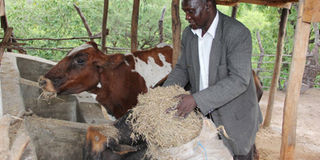Baringo chief leads the way in farming

Andrew Rumenya, Chief for Kimalel location in Baringo feeds his dairy cows on August 08, 2013. Photo/JARED NYATAYA
What you need to know:
- Mr Rumenya has learnt how to balance his administrative duties and farming. When he is not attending to the needs of his residents, he is busy on his farm, where he keeps dairy cattle and poultry, besides cultivating a variety of fruits
Leading by example has enabled Mr Andrew Rumenya to transform livelihoods in the semi-arid Kimalel location in Baringo County.
In what has come to be described as kilimo jangwani (farming in the desert), the Kimalel location chief has grown his financial fortunes and economically empowered his people.
He has learnt how to balance his administrative duties and farming. When he is not attending to the needs of his residents, he is busy on his farm, where he keeps dairy cattle and indigenous poultry besides cultivating a variety of fruits.
In his zero-grazing unit, he has five Ayrshire cows each valued at Sh50,000. About 10 acres of his farm are under different varieties of grass that he uses to prepare hay for the animals.
He also rears dairy goats that fetch him handsome returns.
He bought his first cow from the Kenya Agricultural Research Institute in 1994 and has never looked back.
Initially, he used to leave the cattle to roam around the farm, feeding on their own. However, he discovered that this kind of farming was expensive and exposed his animals to ticks. And he was also not sure whether the animals had fed well.
“Now, unlike before, I can determine how much food they need in a day. I feed them in the morning before I leave for work and so long as there is water for them, I will only return to check on them in the evening,” Mr Rumenya told Money.
He says he has managed to pay for the education of most of his children up to university, thanks to earnings from farming.
He says zero-grazing has helped him save the enormous amount of time he used to spend looking after the animals. He also used to hire a herdsman.
He has a machine for preparing hay. He usually cuts the grass three times in a year to prepare fodder, which becomes handy particularly during dry seasons when natural grass is scarce.
Mr Rumenya says he was the first farmer in the area to invest in a Sahiwal dairy goat, now valued at Sh7,000, when the rest of the community was sceptical about such exotic breeds.
He also engages in beekeeping, the main economic activity for area residents alongside pastoralism.
Mr Rumenya has been gradually improving his goat breeds through artificial insemination. He also encourages upcoming farmers to embrace the dairy goat. Most farmers in the area only keep goats for meat, not milk.
“The goats are promising in terms of returns. Besides the high price for milk, they give birth twice a year to two or three kids,” he says.
Goat milk, he says, is of high nutritional value compared to that of cows. He adds that it is good for people living with HIV.
Kimalel became famous due to the annual goat auction that was usually attended by retired President Moi. Mr Rumenya says the meat of goats from the area is “sweeter” than that from other parts of the country because of the kind of vegetation and salty soil that they feed on.
He also sells grass wich earns him Sh600 per bale.
Mr Rumenya’s day starts at 6am when he engages in farm work before heading to his office, where he embarks on his duties by 9am.
“I like preaching what I do. When I educate people about how well semi-arid areas can be utilised to improve food production, I want to demonstrate that it is possible to do that ,” he told Money at his farm recently.
His farm is used for demonstration during Marigat District’s agricultural field days. Apart from keeping livestock, he grows a variety of fruits, including oranges, mangoes, paw paws, and pineapples.
He started keeping poultry on free range before restricting them two years ago after noticing that he was losing eggs hatched in the bushes. Moreover, the chicken could be stolen or attacked by animals.
Where did Mr Rumenya get the capital to start his venture? He says he started with chicken and indigenous cattle he inherited from his parents. His business has since grown tremendously.
“I cannot accurately say how much my investment is worth but as you can see I have diversified into a number of income-generating projects over the years. My butchery in Koriema also adds to my earnings,” he says proudly.
The farmer says he has travelled to various parts of the country and borrowed a lot of skills on how to improve agriculture in areas that are deemed not suitable for production.
“Instead of investing in a bank, invest at home in what you can see and continue improving on it. The best beggars are those who earn salaries,” says Mr Rumenya.
He adds that those in employment will regret when they reach the end of their careers without investing their earnings wisely.
“The old are at 4pm while the youth are at 10am. One needs to be prepared for what comes next before his sunset days to avoid regrets when it’s too late to change one’s life for the better,” the chief concludes.





